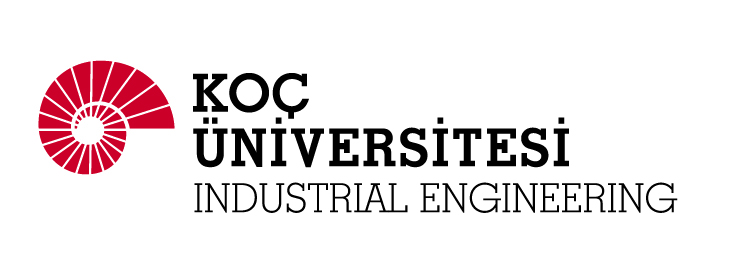Required, non-credit courses:
INDR 590: SEMINAR
INDR 595: MS THESIS
INDR 591: MASTER WITH NON-THESIS TERM PROJECT
INDR 695: PhD THESIS
ENGL 500: ACADEMIC WRITING
TEAC 500: TEACHING EXPERIENCE
ETHR 500: SCIENTIFIC RESEARCH METHODS AND RESEARCH AND PUBLICATION ETHICS
KOLT 500: GRADUATE TEACHING ASSISTANT TRAINING
LIBR 500: LIBRARY RESEARCHER DEVELOPMENT
Required, Credit courses:
INDR 501: OPTIMIZATION MODELS AND ALGORITHMS
INDR 503: STOCHASTIC MODELS AND THEIR APPLICATIONS
INDR 511: ADVANCED OPTIMIZATION METHODS
INDR 513: ADVANCED STOCHASTIC PROCESSES
M.Sc. and Ph.D. level elective courses:
INDR 502: LOGISTICS AND SUPPLY CHAIN SYSTEMS
INDR 504: ADVANCED ENGINEERING MATERIALS MANUFACTURING
INDR 505: MANUFACTURING SYSTEMS
INDR 506: COMPUTER INTEGRATED MANUFACTURING AND AUTOMATION
INDR 508: DISCRETE EVENT SIMULATION
INDR 510: MATHEMATICAL STATISTICS
INDR 520: NETWORK MODELS AND OPTIMIZATION
INDR 530: DECISION ANALYSIS
INDR 540: LOCATION THEORY
INDR 562: INTEGER AND COMBINATORIAL OPTIMIZATION
INDR 564: DYNAMIC PROGRAMMING
INDR 566: SCHEDULING
INDR 568: HEURISTIC METHODS
INDR 570: QUEUEING THEORY
INDR 572: RELIABILITY THEORY
INDR 573: FINANCIAL ENGINEERING
INDR 574: STOCHASTIC MODELS IN FINANCIAL ENGINEERING
INDR 575: PRICING REVENUE MANAGEMENT
INDR 576: HEALTHCARE SYSTEMS OPERATIONS
INDR 578: ADVANCED MODELS IN SUPPLY CHAIN MANAGEMENT
INDR 583: SUPPLY CHAIN MODELING AND ANALYSIS
INDR 584: LOGISTICS MANAGEMENT
INDR 586: HEALTH AND HUMANITARIAN LOGISTICS
MGIS 501: INFORMATION SYSTEMS AND ELECTRONIC COMMERCE
MGIS 541: DATABASE MANAGEMENT SYSTEMS
OPSM 501: OPERATIONS MANAGEMENT
OPSM 539: PROJECT MANAGEMENT
QMBU 501: INTRODUCTION TO MANAGEMENT SCIENCE
DASC 521: INTRODUCTION TO MACHINE LEARNING
Further elective courses may be taken with the advisor’s approval.
Coordinator: Barış Yıldız
Audience: All graduate students (MS or PhD) are required to complete INDR 590. YOK regulations state that MS students, and PhD students with an MS degree, have to get a satisfactory (‘S’) grade by the end of the fourth semester of their studies, while PhD students without an MS degree have to get an ‘S’ grade by the end of the sixth semester. Graduate students failing to satisfy the seminar requirement by these deadlines may be dismissed from the program. Accordingly, students should register for the course either the first semester after completing the requirements, or for the semester they expect to fulfill the requirements (but not later than their fourth/sixth semester). Full-time students are strongly encouraged to complete the requirements within their first year.
Content:
- Students are required to attend face-to-face and online seminars on current research in the specialization fields and emerging areas of industrial engineering. Presentations will be given by faculty members, visiting scholars, and guest speakers. The seminars are announced via email, their time and location may vary. Students are also required to prepare a brief review report for one of the seminars they attended.
Objectives:
- To keep graduate students up-to-date about recent advances in scientific research in industrial engineering, operations research, and related areas, and inform them about research undertaken at our university in these fields. This is accomplished through seminars given by faculty members and invited speakers from world-class research institutions.
Grading & Attendance: INDR 590 is a non-credit course and students who complete the course receive an ‘S’ (Satisfactory) grade. The grading requirements are as follows:
- To earn a passing grade, each student will have to submit brief summary reports for a number of ORCIBS (or other eligible) seminar talks that they attended. The seminars can be attended during any semester of MS or PhD studies.
- Attendance will be taken at seminars. You can only submit reports to seminars that you attended
- Each report should be between 250-400 words in length.
- The reports are to be submitted within three days from the seminar date (i.e., a seminar report for a Friday seminar is due next Monday).
- You can send the reports as PDF or Word documents to the course coordinator.
- All students taking the course have to attend a total of seven seminars and submit one report for one of the seminars they have attended.
- Students who register for the course after having already completed the requirements will automatically receive an ‘S’ grade. Students who register for the semester when they expect to complete the requirements will receive either an ‘S’ (if the requirements are fulfilled) or a ‘U’ grade.
- Prior to the FALL 2017 semester INDR 590 was offered as a two-semester course, with separate requirements for the fall and spring semesters. For students who already completed one (SPRING or FALL) semester of INDR 590, the above requirements are modified as follows:
- For MS students and PhD students with an MS, a previous ‘S’ grade from the FALL semester counts as two attended seminars. A previous ‘S’ grade from the SPRING semester counts as three attended seminars.
- For PhD students without an MS degree a previous ‘S’ grade from the FALL semester counts as four attended seminars. A previous ‘S’ grade from the SPRING semester counts as six attended seminars.
